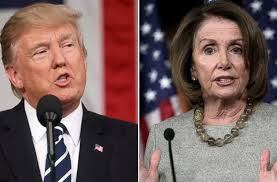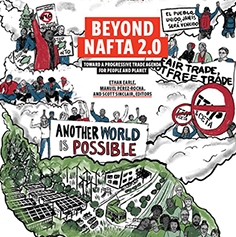In 2017 our strategy had two main components: education and action. We wrote weekly updates on how global trade has been shifting in these uncertain times, specially focusing on NAFTA2, a trade deal that could reshape the economies of the United States, Mexico, and Canada.
This work came along with concrete actions that were meant to delay the NAFTA negotiations through our No NAFTA2 campaign. We organized Twitter Storms, a protest at negotiations in DC, and letter to the editors throughout the country. No fair replacement of NAFTA could have ever taken place in the 5 month span that officials had sought to finish negotiations by. The result would have been a disastrous combination of the original NAFTA deal along with updates taken from the TPP. The efforts of thousands of people who opposed ISDS and a sped up NAFTA process has given us the important feat of delaying a secretive process until what could prove to be a more favorable electoral panorama in 2018.
In 2018, we must continue our work to provide information and taking action on the trade landscape and how it affects day-to-day issues in our lives. With trade deficits going up after Trump’s first 11 months in office, the White House has pledged to crackdown on trade with threats to impose tariffs on Chinese products and aggressively re-engage in negotiations for NAFTA and a free trade deal with South Korea. The TPP negotiations without the US are also expected to proceed along with other major trade deals being struck around the world which will have serious repercussions on the environment and on workers everywhere.
The leftist Mexican presidential candidate, Andres Manuel López Obrador, is leading polls with six months left until the elections, clouding what the future of the NAFTA negotiations could look like given his opposition to past administrations’ privatization policies. In Canada, organizations are preparing rallies around NAFTA and the Paris Climate Agreements during the first round of negotiations of the year on January 23-27. Additionally, US congressional elections will undoubtedly have an impact upon Trump’s ability to strike trade deals that can achieve consensus in Congress. We must put in the work to pressure members of Congress and candidates to take hard stances on corporate trade and not settle for anything less than a full replacement of the free trade model for trade that puts people and the planet first.
A key benchmark which we will use to measure Trump’s power on trade issues in Congress is the April 1st deadline for the White House to request a three-year extension to trade promotion authority (TPA), also known as Fast Track. If this authority is conceded, Congress will be ceding the right to amend trade deals, limiting its participation to an up or down vote, making it easier for the administration to impose deals without additional input.
Nevertheless, we know that no matter what governments or corporations choose to do, it is up to us to build a wide-spread movement to put forth a positive vision for what fair trade looks like and to foment the participation of everyone who is impacted and must have a seat at the table. If we don’t demand trade justice that benefits everyone, then no one will!
Here is to a new year filled with possibilities for progress in the trade justice movement.
Links about trade during 2018:
- Faith leaders letter to Congress on NAFTA
- White House preparing for trade crackdown
- Sierra Club: The 2017 Trade Fight – Three Reasons for Hope
- Eyes on Trade: Trade Deficit Up Under Trump
- Politico: The year of reckoning for Trump’s trade agenda
- NYTimes: As Trump Appeals to Farmers, Some of His Policies Don’t
- IATP: NAFTA and Mexican agriculture
Trade for People and Planet


